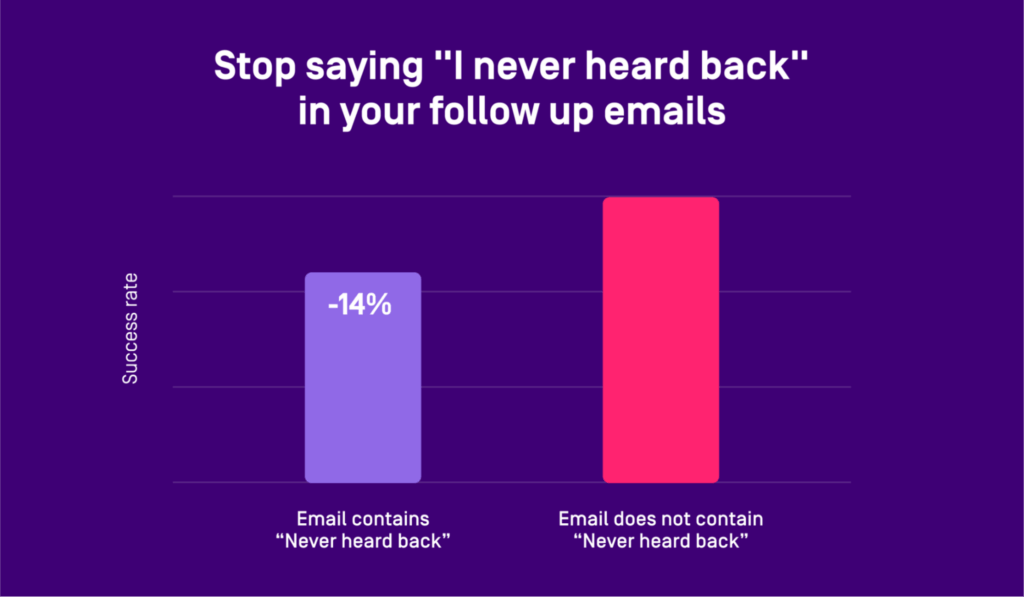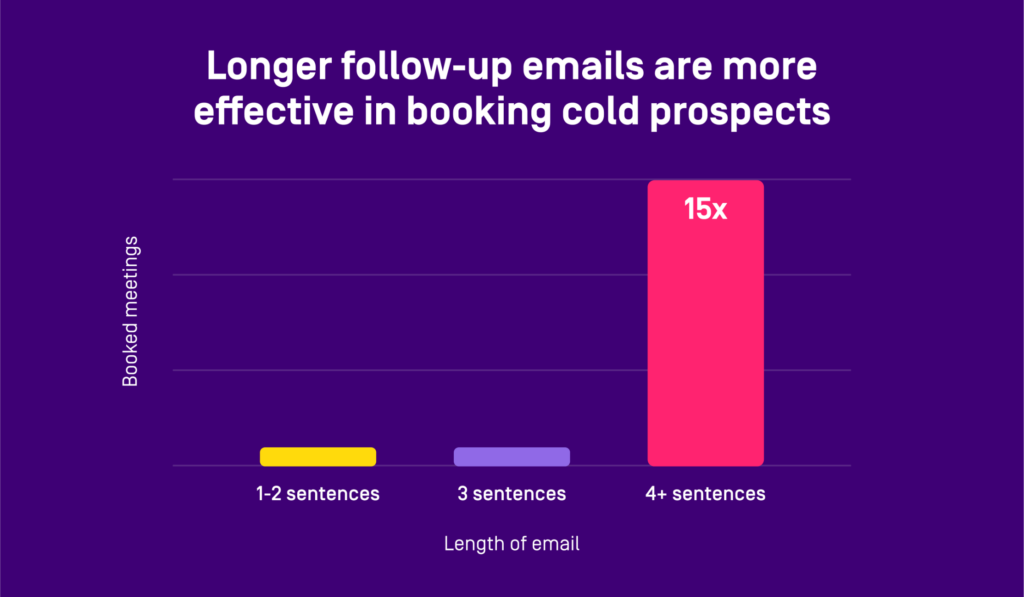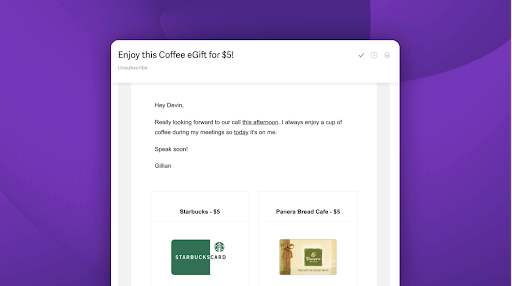How sellers can use the law of reciprocity to win more
You venture out to your mailbox.
It’s been a minute since you’ve visited the place that is usually filled with junk mail. But you don’t want it to overflow. And who knows, maybe there will be a check for a MILLION DOLLARS.
Or maybe not.
The first flyer you see is super-generic. It screams “mass mailing.” No personalization. Nothing “human” about it. #JunkMail.
Then you notice another letter.
Your first and last name and address are handwritten. The envelope is a unique shape. The stamp has been placed in the right-hand corner but is a bit … askew. It was clearly put there by a (wait for it) HUMAN BEING. You don’t recognize the sender’s name or return address.
You are curious. Your interest has been officially piqued!
If you do NOT open it, you’d feel kinda bad. After all, someone took the time to write what is likely a personal letter.
You are 100% going to open this letter.
Why: The Law of Reciprocity.
What is The Law of Reciprocity?
Dr. Robert Cialdini, “The Godfather of Influence” (and on our list of the best sales books), is best known for his 1984 book, Influence: The Psychology of Persuasion.
In this NY Times Best Seller, Dr. Cialdini’s outlines 6 “Principles of Persuasion”:
- Reciprocity
- Scarcity
- Authority
- Consistency
- Liking
- Social Proof
As Dr. Cialdini says here, “Simply put, people are obliged to give back to others in the form of a behavior, gift, or service that they have received first.
If a friend invites you to their party, you feel obligated to ask them to a future party you are hosting. Likewise, if a colleague does you a favor, then you owe that colleague a favor. And in the context of a social obligation, people are more likely to say yes to those who they owe.”
He also states, “So the key to using the Principle of Reciprocity* is to be the first to give and to ensure that what you give is personalized and unexpected” (emphasis mine).
The story above, in the intro … that’s the Principle of Reciprocity in action.
When used tactfully, appropriately, in a non-cheesy manner … reciprocity makes it quite hard to say no.
*Note: Law of Reciprocity = Principle of Reciprocity (and vice versa)
Examples of Reciprocity in Sales
I know what you are thinking, “isn’t reciprocity just another way of saying guilt?” As in, it’s not that I feel obligated to return the favor; it’s just that I feel guilty if I don’t.
Wrong.
Guilt is sending a follow-up email to a buyer and leading with, “I never heard back.”
We’ve all done it before.
But here’s the thing: While this wording does tend to increase reply rates, it actually decreases meetings booked by 14%.

If your goal is just to get a reply, go for it. But that satisfaction will be short-lived when you don’t book that next meeting — the true purpose of a follow-up email, right?
“Never heard back” makes your buyer feel guilty.
It’s the opposite of The Law of Reciprocity.
Let’s look at a few examples of The Law of Reciprocity in action.
The Law of Reciprocity: Personalization
Remember earlier when we quoted Dr. Ciadilni? “The key to using the Principle of Reciprocity is to be the first to give and to ensure that what you give is personalized and unexpected” (again, emphasis mine).
Personalization matters!
When sending follow-up prospecting emails, it’s possible to send a valuable note while still being tight, compact, and straightforward. Even emails that are 150+ words (considered “long”) can be effective if it’s concise, well-crafted, packed with value (info that connects the prospect or their company to your offer, AND if the message is personalized, direct, and intentional in every sentence.
AND … longer emails* are significantly more effective in booking a meeting, 15 TIMES more effective:

*Assumption: Longer emails include more personalization. While this is not always the case, it’s often true.
The Law of Reciprocity: Send A Custom Video
Speaking of personalization, if you really want to up your reciprocity game (and “ensure that what you give is personalized and unexpected”), try this:
Send your buyer a personalized, customized, one-off, just-for-them video.
Does this take extra time? Yes.
Does this take extra effort? Yup.
Does this require extra research on your part? HECK yeah.
Is it often worth it in the end? Maybe. Just kidding — of COURSE, it is!
In a recent episode of Reveal, The Revenue Intelligence Podcast, David Priemer, Founder and Chief Sales Scientist at Cerebral Selling, shares more about personalized video.
He likes to “record little, few-minute videos and send them to people.” Per David, you don’t have to be on a Zoom call.” He says that even just having your prospect see you is powerful, not just because they see you in person, but … wait for it … because of the Law of Reciprocity.
“The other kind of secret little tactic that’s baked into [this approach],” says David, is…the fact that you put in the effort to make a custom little video for someone.”
You (the seller) took the extra time, put in the extra effort, and did extra research for (little old) ME? Dang. I kinda sorta feel like I owe you.
#LawOfReciprocity in action.
The Law of Reciprocity: Take the Burden
Burden: a duty, a responsibility, the bearing of a load, something oppressive or worrisome (Merriam-Webster).
One of the worst things you can do as a sales rep is to ask your buyer to DO SOMETHING … to burden them.
There is a perfect opportunity to “take the burden” when it comes to your champion — you know, the buyer who is going to bat for you to get money from their CFO, approval to buy your product from their VP.
Instead of saying:
“Let me know what your CFO/boss says about [insert name of your product/service/company]. I’ll check back in a few days unless I hear from you sooner.”
Try this: Build your champion’s buying guide for them. Take the burden!
Nobody pitches your product better than you, one of the company’s top sales reps, right? Unfortunately, if you let your champion give it a go, they will likely fall back on feature selling (dumping).
Building your champion’s buying guide accomplishes a few things:
- Makes you a better seller over time as it forces you to adopt the buyer/customer’s perspective rather than your own.
- Encourages you to really boil down how your product specifically, directly solves your buyer’s pain.
- Allows you to control the narrative, focusing on the critical aspects of your product. The pain points uncovered during discovery? Ensure your deck covers them all.
- Puts you in a favorable light. Most competitors will not go this extra mile.
Finally, building your champion’s buying guide sets up the perfect Law of Reciprocity situation.
You took their burden. You built them your … errr … THEIR sales deck to pitch to their boss. As a result, your champion is more likely to choose your product over others because you hooked them up, saving them a ton of extra work.
The Law of Reciprocity: Trigger An Unfair Exchange
All top sales reps know how to build rapport, create a relationship with your buyer.
But the top of the top sales reps? They build rapport in their sleep. But, they don’t stop with a solid relationship. Instead, they do things that trigger an unfair exchange.
The top-notch sellers delight buyers with the unexpected.
One way to accomplish this is to move away from behind your monitor and into the real (physical) world.
Generally speaking, it’s unlikely you’ll be able to meet your buyer in person. BUT, you can still do something meaningful and unexpected.
COFFEE GIFT CARD!

Congrats. For $5, you’ve just created unexpected joy for your buyer. You’ve done something unique. You are a thoughtful human being!
And, as I’m sure you’ve guessed by now, this simple act has triggered the Law of Reciprocity.
Note: this tactic only works if your buyer actually accepts this gift. If the coffee card isn’t redeemed, the Law of Reciprocity does not apply.
Oh, and if you can personalize the gift (Venti Iced Pumpkin Spice latte with an extra shot), you win.
Use These Cold Call Scripts To Go From “Maybe” to “Yes.”
The above examples are just a few ways to use the Law of Reciprocity to your advantage during cold calls.
The goal of any cold call is to move your prospect from “hello” to “yeah, let’s chat more on Wednesday at 2 PM PT.”
We’ve got you covered with these 3 highly effective cold calling scripts. To put these together, we analyzed 100K cold calls to learn what really works (and what doesn’t), so you can book more meetings.
